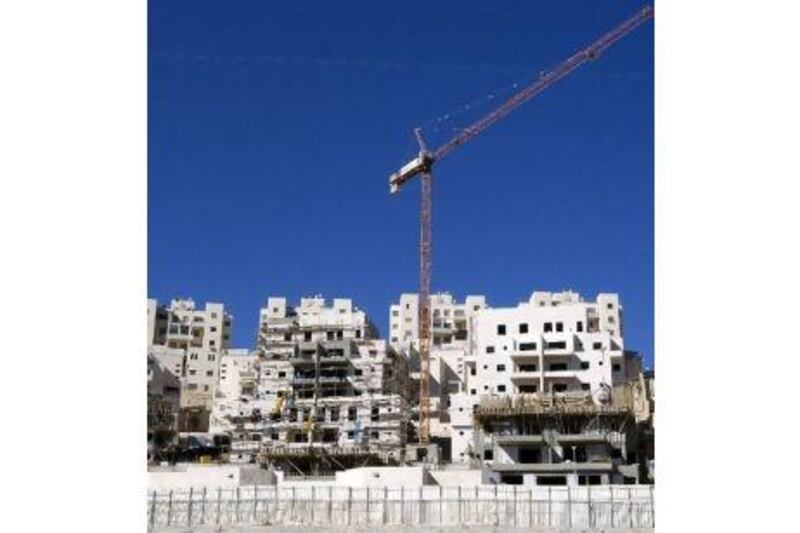Report says moderate Israeli president has new idea for peace
Vita Bekker
Foreign Correspondent
TEL AVIV // Shimon Peres, the dovish Israeli president and a prominent advocate for the creation of a Palestinian state, has begun advancing a peace plan in which Israel would be able to keep most of its Jewish settlements in the occupied West Bank.
Until recently, Mr Peres, also a Nobel laureate for his role in achieving the interim Oslo peace deal, had indicated that the two-state solution would require the dismantling of many settlements, though Israel would still retain control over the major settlement blocs located near Jerusalem and to the west of the controversial West Bank security barrier.
Yet according to a report yesterday in the mass-circulation Maariv newspaper, Mr Peres is now prepared to accept that Israel keep all the settlements that it considers legal, including those east of the barrier, for the sake of avoiding a mass evacuation that would be difficult to carry out in the face of right-wing resistence.
The change in tack by Mr Peres was reported yesterday by a top political commentator for Maariv newspaper, Ben Caspit, who called Mr Peres's plan a "sensational" shift from his previous stance of promoting the evacuation of most settlements from territory that Palestinians want for a future state.
If true, it is likely to draw the attention of Palestinian and Western diplomats because Mr Peres is regarded abroad as one of Israel's chief proponents for the establishment of a Palestinian state alongside Israel. The office of president in Israel is a largely symbolic position, but the 88-year-old Mr Peres is viewed as influential on the policies of Israel's right-wing prime minister, Benjamin Netanyahu.
Such views, however, will probably face vehement opposition from Palestinian leaders, who have repeatedly called Israeli settlements a key impediment to their aspiration for statehood. Last September, the Palestinians refused to return to US-backed direct talks after Mr Netanyahu's government rejected extending a partial freeze on settlement construction that had just expired.
Mr Peres is perhaps regarded with more respect outside of Israel than in his home country, where he has faced some ridicule for failing to win an election in the five times that he ran for the premiership.
Israeli commentators say that in recent years, the president has become a kind of bridge between Israel's predominantly right-wing, pro-settler government - in which many ministers oppose the two-state solution and a settlements' evacuation - and the international community that has long supported creating a Palestinian state.
His background lends him credibility as a dovish statesman because he not only won the Nobel Peace Prize in 1994 but helped in 2005 found the centrist Kadima party that calls for a withdrawal from most West Bank settlements.
Mr Caspit, the Maariv commentator who publicised what he termed as Mr Peres's new "peace with settlements" plan, said the president has stepped up the promotion of his ideas in recent weeks in confidential discussions with various politicians and government officials.
Mr Peres is trying to pressure Mr Netanyahu to offer a fresh peace deal that would reignite frozen talks with the Palestinians and pre-empt possible United Nations recognition of a Palestinian state in the West Bank and Gaza in September, according to Mr Caspit.
The Palestinians have intensified their campaign for such recognition in the absence of progress in negotiations with Israel, and Israeli officials are worried that such a move by the UN would weaken the country's hand in the future settlement of its final borders with Palestine.
Mr Peres's views on retaining the settlements would be more in line with the stances of Mr Netanyahu, who is viewed as incapable of evacuating settlements because he would stand to lose the support of the ranks of Israel's growing right-wing.
Israeli media has reported that Mr Netanyahu would be open to accepting a Palestinian state that includes the West Bank, with Jewish settlements in the territory remaining intact and connected to Israel proper by road.
Mr Caspit wrote that Mr Peres is pressing the premier to officially announce that his government would accept the concept that all territory conquered by the country in the 1967 Arab-Israeli war - including the West Bank and the Gaza Strip - would become part of a Palestinian state. However, already existing settlements would remain in Israeli hands and the Palestinians would be compensated with territory from other Israeli areas bordering their future state.
According to Mr Caspit, Mr Peres told Mr Netanyahu to advance such a plan as part of a re-election strategy ahead of a parliamentary vote scheduled for next year, as a way of drawing the support of a large camp of right-wing and centrist Israelis.
Mr Netanyahu is believed to be preparing to publicise a new peace plan, which he may unveil later this month when he is due to address US Congress.
"The fact that Peres has come to terms with the concept of settlements not being evacuated is no less than sensational," Mr Caspit wrote. "Did he reach the conclusion that Israel is no longer capable of carrying out such a wide pullout? Does he see the situation in the West Bank as irreversible? Looks like it."






